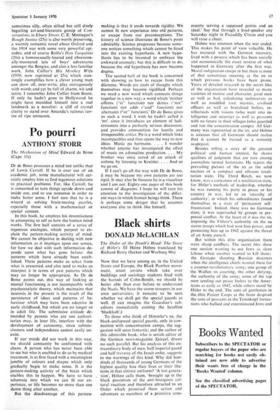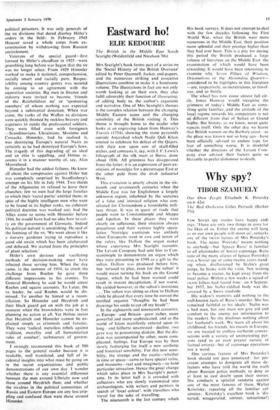Black shirts
DONALD McLACHLAN
The Order of the Death's Head: The Story of Hitler's SS Heinz Hahne translated by Richard Barry (Seeker and Warburg 90s) Now that we have among us, in the United States and Europe, the Black Panther move- ment, street soviets which take over buildings and sociology students fired with the hatreds of Cohn-Bendit, we should be better able than ever before to understand the Nazis. We have the storm troopers in our own universities; it remains to be seen
whether we shall get the special guards as well. (I can imagine the Guardian's sub- editors immediately coining the headline `blacklash'.) To those who think of Himmler's ss, the black-uniformed special guards, only in con- nection with concentration camps, the sug- gestion will seem fantastic; and the author of this admirable book, who is serials editor of the German news-magazine Spiegel, draws no such parallel. But his analysis of this ex- traordinary body of men, half imperial guard and half travesty of the Jesuit order, suggests to me warnings of this kind. Why did hun- dreds of thousands of young Germans of the highest quality lose their lives or their illu- sions in that sinister uniform? 'A lost genera- tion', Mute calls them, 'brought up in the black pessimism of the anti-bourgeois cul- tural reaction and therefore attracted to an Order which promised them action and adventure as members of a primitive corn- munity serving a supposed genius and an ideal.' Say that through a loud-speaker any Saturday night in Piccadilly Circus and you will raise a cheer.
Hahne was nineteen when the war ended. This makes his point of view valuable. He has matured with the German recovery, lived with a process which has been socially and economically the exact reverse of what happened in Germany after the first war. Moral indignation creeps in but there is none of that censorious sneering at the ss to which previous books have been prone. Years of detailed research in the secret files of the organisation have revealed so many varieties of motive and character, good men as well as bad, calculating technocrats as well as muddled race mystics, civilised officers as well as brutalised bullies, in- tellectuals with visions (who went into in- telligence and security) as well as peasants with no future in their villages (who guarded and ran the concentration camps). All Ger- many was represented in the ss; and Hahne is anxious that all Germans should realise that it cannot be treated as a minority scapegoat.
Besides telling a story of the greatest political and human interest, he shows qualities of judgment that are rare among journalists turned historians. He rejects the prevailing picture of the ss as the solid nucleus of a compact and efficient totali- tarian state. The Third Reich, we now know, was a caricature of a totalitarian state, for Hitler's methods of leadership, whether he was running his party in peace or his country in war, led to an 'anarchy of authority', in which his subordinates found themselves in a state of 'permanent self- frustration'. Indeed, there was no German state; it was superseded by groups in per- petual conflict. At the heart of it was the ss, imposing the Fiihrer's authority on the SA storm troops which had won him power, and protecting him up to 1942 against the threat of an Army putsch.
But within this elite organisation there were sharp conflicts. The secret _files show one section wanting to use Jews as slave labour when another wanted to kill them: the Gestapo shooting Russian deserters when the intelligence chiefs wanted them for a counter-revolutionary army; one group of the Waffen ss courting, the other defying, the authority of the army; some of the top men sending out peace feelers to the Amer- icans as early as 1942, while others stood by Hitler to the end. The sons of gentlemen in the elite Panzer Corps at the front despised the sons of peasants in the Totenkopf forma- tions who bullied and exterminated Jews and
political prisoners. It was only generals of the ss divisions that dared disobey Hitler's orders in the field: in February 1943 Hausser saved a whole corps from ex- termination by withdrawing from Russian encirclement.
Veterans of the special guard—first formed by Hitler's chauffeur in 1925—were grumbling long before war began that the ss was no longer select. From 1929 Himmler worked to make it national, comprehensive, socially smart and racially pure. Respec- tability among country gentry was secured by coming to an agreement with the equestrian societies. Big men in finance and industry were invited to become 'friends of the Reichsfiihrer ss' or 'sponsoring members' of whom nothing was expected beyond a substantial donation. When war came, the ranks of the Waffen ss divisions were quickly thinned by reckless bravery and eagerness to outdo the professional soldiers. They were filled even with foreigners —Scandinavians, Ukrainians, Moslems and Cossacks. Himmler, had he realised it, was destroying Europe's natural Nazis as certainly as he had destroyed Europe's Jews. The tragedy of this degrading o,f an ideal and an elite is appalling, and Moline re- counts it in a manner worthy of, say, Alan Moorehead.
Himmler had the oddest failures. He knew all about the conspiracies against Hitler but was completely surprised by Stauffenberg's attempt on his life in July 1944. Two thirds of the Allgemeine ss refused to leave their churches; few ss men had the large families to which their 'racial purity' entitled them; in spite of the highly intelligent men who were to be found in its higher ranks, no coherent political doctrine was worked out: had the Allies come to terms with Himmler before 1944, he would have had no idea how to car- ry on the government of Germany. Indeed his political naiveté is astonishing. He said of the forming of the ss, 'We went about it like a nursery gardener trying to reproduce a good old strain which has been adulterated and debased. We started from the principles of plant selection.'
Hitler's own devious and vacillating methods of decision-making must have infected those serving him. When the day came, in the summer of 1934, to crush the challenge from Roehm he gave three different impressions to his cronies. To General Blomberg he said he would arrest Roehm and square accounts. To Lutze, the sa leader, he said Roehm would be dis- missed. To another he hinted at a recon- ciliation. So Himmler and Heydrich and their black guard got on with the job at a moment when the brownshirts were in fact planning no action at all. Yet Hohne insists that Heydrich and Himmler cannot be ex- plained simply as criminals and fanatics. They were 'radical, merciless rebels against tradition, morality and all humanitarian rules of conduct', technocrats of govern- ment.
I strongly recommend this book of 580 pages to the general reader because it is readable, well translated, and full of in- cidental insights into what must be going on in the secret organisations and public demonstrations of our own day. I wonder whether there is any essential difference between the men around Ulbricht now and those around Heydrich then; and whether the rivalries in the political committees of Russia and Eastern Europe are any less crip- pling and confused than were those around Himmler.















































 Previous page
Previous page